by Ann Kennedy
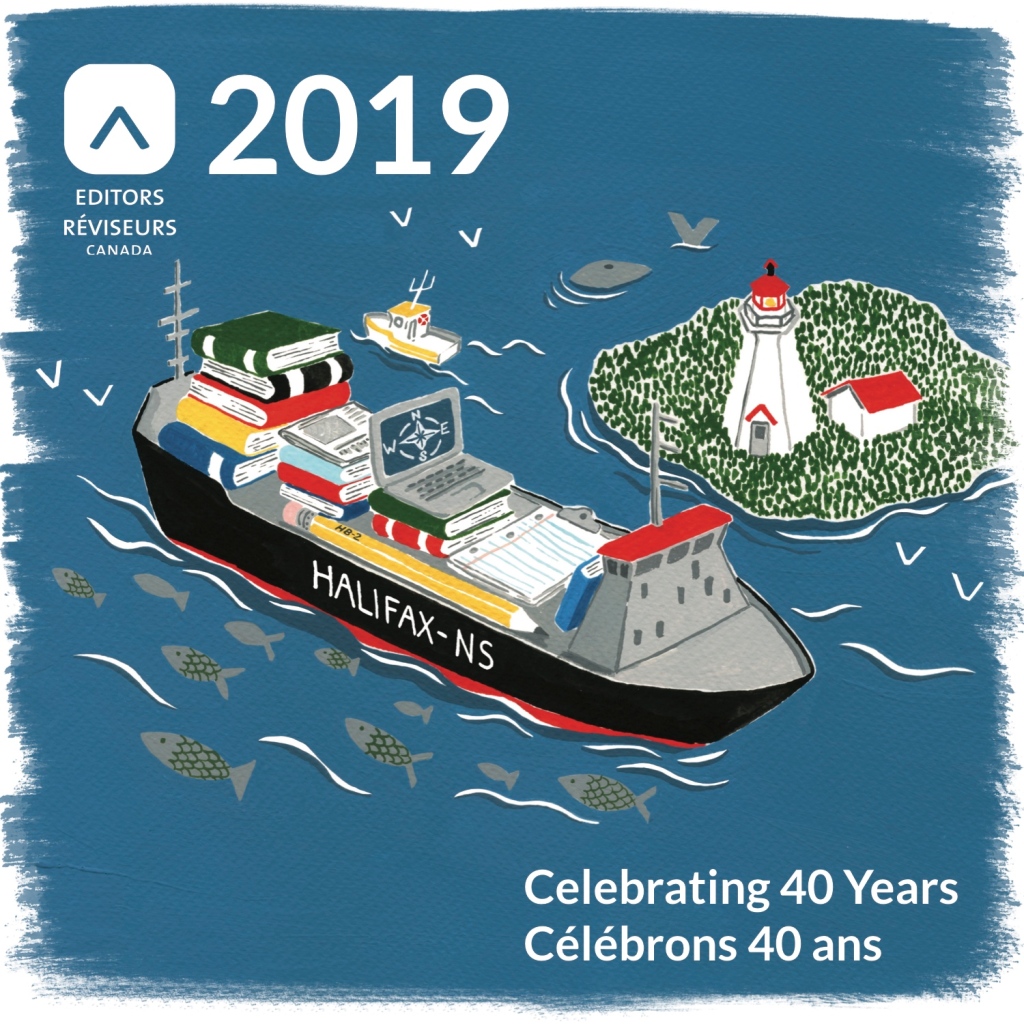
On June 7, 8, and 9, editors from across North America and as far away as Australia gathered in Halifax, Nova Scotia, to reconnect, learn new skills, and refresh long-used ones. The annual Editors Canada conference was held this year at The Westin Nova Scotian, an ideal location for hitting the local farmers’ market for breakfast before sessions started, and just around the corner from the boardwalk for an evening stroll and a lobster roll at one of the popular waterside restaurants.
Four pre-conference seminars were offered, and though I wished I could have attended all four, I opted for Amy J. Schneider’s seminar, “Macros 101: Work Smarter, Not Harder.”
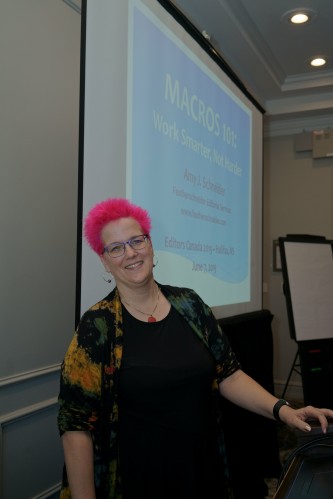
For the uninitiated like me, a macro is a computer program that runs inside Microsoft Word and enables a set of pre-defined, customized instructions to efficiently, accurately, and consistently perform tasks. These tasks can run from the mundane (such as converting two spaces to one or changing British English to American English) to the complex (such as ensuring that every instance of a certain abbreviation is capitalized and in bold). As someone who just finished a manuscript that was in dire need of consistency, I was very excited to learn more about macros and how they can save editors time by automating frequently performed tasks. The session was well worth the extra fee, for both content and quality. I came away with not only several pages of hand-outs with the session highlights, but also a list of websites and books to consult for more information.
The main conference itself took place over two days and included an opening keynote by renowned journalist and author Linden Macintyre; a closing keynote by multi-award-winning writer, speaker, and educator Sheree Fitch; the Editors Canada annual general meeting; and 40 sessions on topics ranging from managing a freelance business to editing scholarly papers to navigating language and diversity to preparing for the Editors Canada certification exams.
Highlights from the main conference programming for me included Michelle Waitzman and Jess Shulman’s “Making smart choices: Which freelance projects are right for you?”; James Harbeck’s “Translating medicalese into everyday English”; and Dean Jobb and Kim Pittaway’s “Negotiating the truth: Drawing the line in creative nonfiction”. As a freelance editor living with a physical disability whose dream is to edit memoirs, these sessions alone were worth the trip to Halifax!
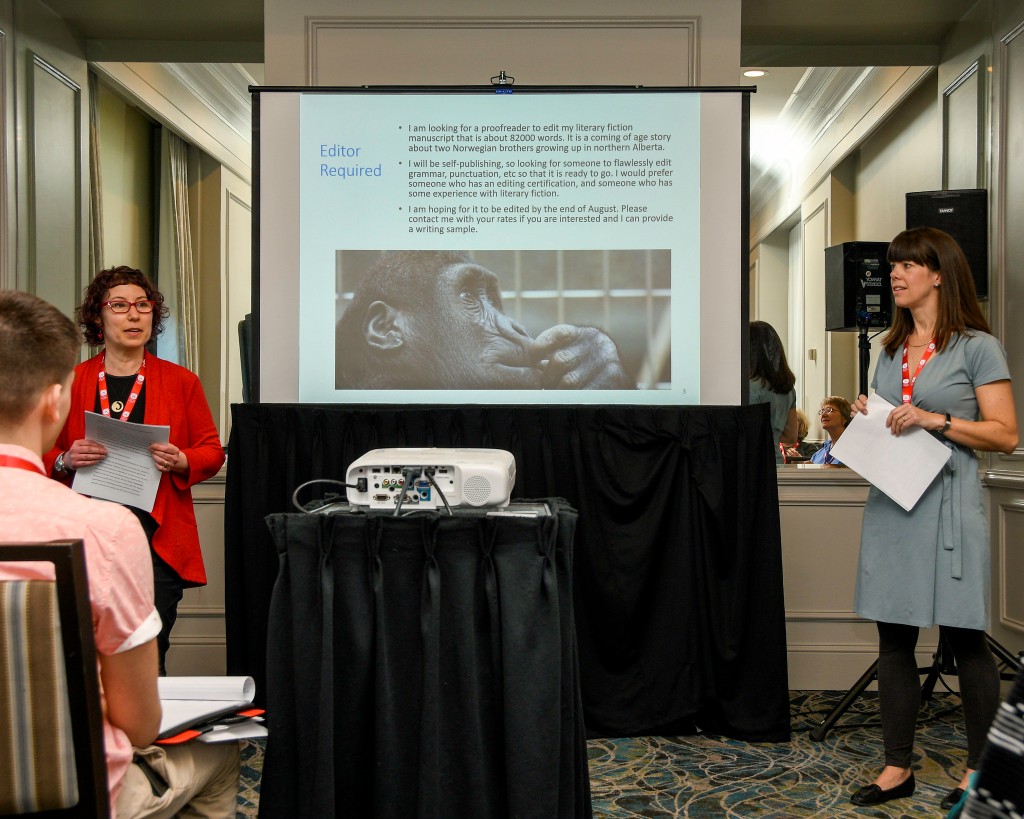
Michelle and Jess advised breaking down the benefits and drawbacks of a potential freelance project into four categories: deal-breakers, must-haves, rather-nots, and nice-to-haves. Deal-breakers are elements of the project that would lead you to turn it down; must-haves are those elements that the project must contain for you to accept it; rather-nots are elements you’d rather not have but can live with if necessary; and nice-to-haves are elements that are a bonus (but you’d still accept a project that didn’t contain these). Examples of the considerations include the fee for the project, the type of work you want to be doing, the subject matter you’re interested in, the deadline, client demands, your history with the client, and your skills (i.e. do I have the right skills for the job, or is this the kind of skill I want to grow?).
Michelle and Jess stressed that it’s very important to identify your motivations and needs, as well as the conditions that will detract significantly from your productivity—because, after all, productivity equals income. Ultimately, knowing and sticking to your priorities is part of a good business plan.
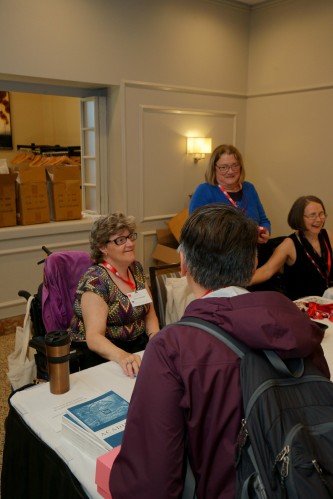
James’s session on translating “medicalese” opened with a concept that I wish more health professionals realized: health is about people! The passive voice and non-human subjects are sprinkled throughout health reports, along with liberal amounts of jargon. As with all communications we edit, the first question for us to ask is “Who is involved and why?” Typically, there are many stakeholders involved, including medical researchers, publishers, journalists, and ordinary people with health concerns. As James says, the ordinary person does not want to know the technical terms but does need to understand them. Context is vital—the story itself is almost never the whole story. As editors who work in the medical genre, we need to ensure that the ordinary person (the patient or their family) has enough information to make balanced and informed decisions.
James also discussed how careful word choice can impact the ordinary person’s understanding of medical information. Many medical and health terms have unique connotations in particular contexts. To someone who lives with hearing loss, deafness may be a condition, but Deaf is part of their identity. Then there are the “loaded” phrases like “suffers from” and “victim of” that paint the subject as someone to be pitied. Editors owe it to the reader to pay attention to word choice and avoid such “word bombs.”
At their session titled “Negotiating the truth: Drawing the line in creative nonfiction,” Kim and Dean used real-life examples from their own experiences as journalists and authors to discuss the fine line writers and editors must negotiate when working on historical non-fiction, investigative journalism, and memoir. When a subject is long dead, how does one deal with reported dialogue? What about the details that can’t ever be fact-checked? The thought-provoking discussion at this session explored how to maintain the reader’s interest while not crossing the line into fiction.
The two-day vendor fair was another fun place to visit and socialize between sessions. It featured everything from hand-crafted, decadent, chocolate-covered caramels to cards and prints by Kat Frick Miller, the talented artist who custom-designed the image on the conference swag bag and program cover. Of course, there were also booths with representatives from ACES and The Chicago Manual of Style (where I dropped a bundle—albeit at discounted prices—in the name of professional development).
As is customary at Editors Canada conferences, there were opportunities to simply meet and mingle—dinner was organized at a couple of restaurants the evening before registration opened, and then, of course, there was the opening night reception. In addition, a walking tour of Halifax was a lovely way to meet participants and see the local sites at the same time.
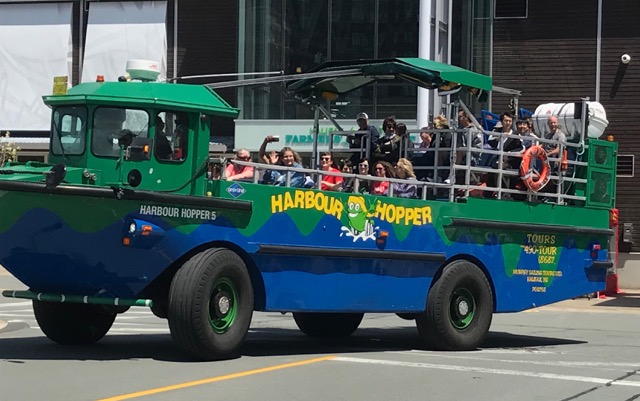
Outside of the conference, there was much to explore in Halifax. At Trident Booksellers & Cafe, just down the street, I browsed the eclectic collection of books, purchasing several that featured local stories including The Other Halifax Explosion: Bedford Magazine, July 18-20,1945 by H. Millard Wright and Out of the Depths: The Experiences of Mi’kmaw Children at the Indian Residential School at Shubenacadie, Nova Scotia by Isabelle Knockwood. It was the perfect way to start my day as a tourist before heading for the airport later that day. I also had time to board the Harbour Hopper, the amphibious bus that transports its passengers from Halifax Citadel National Historic Site to Halifax Harbour.
The second international Editors Canada conference will take place in Montreal, Quebec, in 2020—and I’m very much looking forward to it! So much so that I joined the conference committee. If you have some time to volunteer in the planning stages or at the conference, I highly recommend it! Your involvement will only enrich your experience of the conference itself.
Ann Kennedy is dedicated to reviving the skills and importance of excellent spelling, grammar, punctuation, and syntax in the digital age. She specializes in biography and memoir, travel literature, and plain language.
This article was copy edited by Ellen Fleischer.
